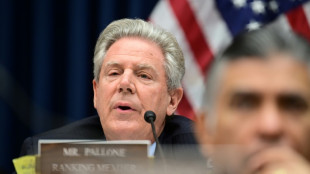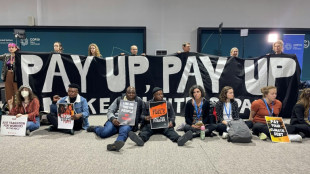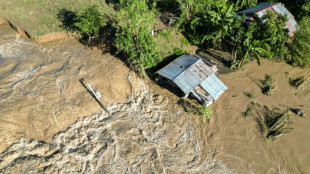
-
 US lawmaker accuses Azerbaijan in near 'assault' at COP29
US lawmaker accuses Azerbaijan in near 'assault' at COP29
-
Tuchel's England have 'tools' to win World Cup, says Carsley

-
 Federer hails 'historic' Nadal ahead of imminent retirement
Federer hails 'historic' Nadal ahead of imminent retirement
-
Ukraine vows no surrender, Kremlin issues nuke threat on 1,000th day of war

-
 Novo Nordisk's obesity drug Wegovy goes on sale in China
Novo Nordisk's obesity drug Wegovy goes on sale in China
-
Spain royals to visit flood epicentre after chaotic trip: media

-
 French farmers step up protests against EU-Mercosur deal
French farmers step up protests against EU-Mercosur deal
-
Rose says Europe Ryder Cup stars play 'for the badge' not money

-
 Negotiators seek to break COP29 impasse after G20 'marching orders'
Negotiators seek to break COP29 impasse after G20 'marching orders'
-
Burst dike leaves Filipino farmers under water

-
 Markets rally after US bounce as Nvidia comes into focus
Markets rally after US bounce as Nvidia comes into focus
-
Crisis-hit Thyssenkrupp books another hefty annual loss

-
 US envoy in Lebanon for talks on halting Israel-Hezbollah war
US envoy in Lebanon for talks on halting Israel-Hezbollah war
-
India to send 5,000 extra troops to quell Manipur unrest

-
 Sex, drugs and gritty reality on Prague's underworld tours
Sex, drugs and gritty reality on Prague's underworld tours
-
Farmers descend on London to overturn inheritance tax change

-
 Clippers upset Warriors, Lillard saves Bucks
Clippers upset Warriors, Lillard saves Bucks
-
Acquitted 'Hong Kong 47' defendant sees freedom as responsibility

-
 Floods strike thousands of houses in northern Philippines
Floods strike thousands of houses in northern Philippines
-
Illegal farm fires fuel Indian capital's smog misery

-
 SpaceX set for Starship's next flight, Trump expected to attend
SpaceX set for Starship's next flight, Trump expected to attend
-
Texans cruise as Cowboys crisis deepens

-
 Do the Donald! Trump dance takes US sport by storm
Do the Donald! Trump dance takes US sport by storm
-
Home hero Cameron Smith desperate for first win of 2024 at Australian PGA

-
 Team Trump assails Biden decision on missiles for Ukraine
Team Trump assails Biden decision on missiles for Ukraine
-
Hong Kong court jails 45 democracy campaigners on subversion charges

-
 Several children injured in car crash at central China school
Several children injured in car crash at central China school
-
Urban mosquito sparks malaria surge in East Africa

-
 Djibouti experiments with GM mosquito against malaria
Djibouti experiments with GM mosquito against malaria
-
Pulisic at the double as USA cruise past Jamaica

-
 Many children injured after car crashes at central China school: state media
Many children injured after car crashes at central China school: state media
-
Asian markets rally after US bounce as Nvidia comes into focus

-
 Tens of thousands march in New Zealand Maori rights protest
Tens of thousands march in New Zealand Maori rights protest
-
Five takeaways from the G20 summit in Rio

-
 China, Russia ministers discuss Korea tensions at G20: state media
China, Russia ministers discuss Korea tensions at G20: state media
-
Kohli form, opening woes dog India ahead of Australia Test series

-
 Parts of Great Barrier Reef suffer highest coral mortality on record
Parts of Great Barrier Reef suffer highest coral mortality on record
-
Defiant Lebanese harvest olives in the shadow of war

-
 Russian delegations visit Pyongyang as Ukraine war deepens ties
Russian delegations visit Pyongyang as Ukraine war deepens ties
-
S.Africa offers a lesson on how not to shut down a coal plant

-
 Italy beat Swiatek's Poland to reach BJK Cup final
Italy beat Swiatek's Poland to reach BJK Cup final
-
Japan, UK to hold regular economic security talks

-
 Divided G20 fails to agree on climate, Ukraine
Divided G20 fails to agree on climate, Ukraine
-
Can the Trump-Musk 'bromance' last?

-
 US to call for Google to sell Chrome browser: report
US to call for Google to sell Chrome browser: report
-
Macron hails 'good' US decision on Ukraine missiles

-
 Italy eliminate Swiatek's Poland to reach BJK Cup final
Italy eliminate Swiatek's Poland to reach BJK Cup final
-
Trump expected to attend next Starship rocket launch: reports

-
 Israeli strike on Beirut kills 5 as deadly rocket fire hits Israel
Israeli strike on Beirut kills 5 as deadly rocket fire hits Israel
-
Gvardiol steals in to ensure Croatia reach Nations League quarter-finals


Colombia rebel group imposes control in restive coca zone
A veneer of calm has settled over Narino, one of the most violent regions of Colombia, where armed groups until recently waged bloody battles for control of vast coca fields.
The guerrilla group Segunda Marquetalia has taken control of the southwestern region -- roughly the size of Belgium -- using financial backing from Mexican cartels to unify myriad armed outfits, analysts say.
"The change has been spectacular, the groups have united, the violence has reduced considerably," said Jerson David, the president of a local association of subsistence farmers who work in the coca fields.
"Here, people grow coca according to the rules of the Segunda Marquetalia," he added.
Nearby, workers carry sacks filled with vivid green coca leaves that will be crushed and mixed with gasoline and chemicals in a makeshift laboratory, making a paste that will later become cocaine.
Coca fields stretch as far as the eye can see around the town of Zavaleta. In 2022, the Narino region grew some 40 percent of the total coca in Colombia -- the world's main cocaine producer.
In the town's center, packs of motorbikes roar down the main street, and men dripping in gold chains and with handguns at their sides stare suspiciously at strangers.
At the entrance to the town hangs an old banner: "Segunda Marquetalia wishes you a Merry Christmas."
- 'Cauldron of violence' -
Until 2016, it was the Marxist Revolutionary Armed Forces of Colombia (FARC) guerrilla group that held a monopoly over the profitable region.
When the group signed a landmark peace agreement with the government that year, "there was a rush to occupy this space," explained Elizabeth Dickinson, an analyst for the International Crisis Group (ICG).
Narino became a "cauldron of violence and competition around drug trafficking."
Segunda Marquetalia was formed by the chief FARC peace negotiator, Luciano Marin -- alias Ivan Marquez -- who launched a new rebellion in 2019.
Dickinson said one of the group's commanders had links with Mexican cartels who provided the capital to recruit forces from other regions.
"The Segunda Marquetalia, with that influx of money and fighters, swept through Narino with remarkable speed," in the last two years, she said.
The takeover also involved a bloody war with another FARC dissident group, the EMC (Central General Staff) in 2023.
Since then, Segunda Marquetalia has reigned supreme in this Pacific coastal region, where the Andes descend into the foothills of the Amazon, towards scorching savannah and seaside mangroves.
Narino in 2023 accounted for 27.3 percent of all victims of conflict in Colombia, according to the Indepaz think tank.
About 30 massacres have been committed there and 130 community leaders killed since 2016.
- 'Pact' with locals -
In the baking afternoon heat in Zavaleta, coca workers and guerrillas, with beers in hand, flock to bars like "El Patron", bearing the image of the late narco kingpin Pablo Escobar.
The police and army are totally absent, entrenched behind sandbags at their bases dozens of kilometers away.
The guerrillas keep a close watch over coca production and development projects such as road building.
Like several of Colombia's armed groups, Segunda Marquetalia has been involved in stop-start peace negotiations with the government.
"Peace, and the abandonment of coca, requires a transformation of the land, that is to say road construction, electricity networks," the group's second-in-command and chief negotiator, Walter Mendoza, told AFP surrounded by gun-toting men.
The group says it works in the interest of local communities, but experts refer to coercive control of the population.
Local journalist Winston Viracacha described the relationship as a "pact" in which locals carry out projects for the benefit of both sides, in return for payment from the guerrillas who "ensure order and social control."
One reason for the respite from violence is that the armed group is no longer interested in taking on the government directly.
"What interests them is local control to facilitate illegal economic activity. Rather than fighting the army, they want to control the population," said Dickinson.
Segunda Marquetalia has enforced its authority in other towns too, such as coastal Tumaco with its mainly Afro-Colombian population and long history of extreme poverty and violence between armed groups.
Until 2023, "no foreigner could set foot" in Bajito, a neighborhood of Tumaco with a pretty beach where mutilated bodies used to turn up, said municipal councillor Duvan Mosquera Cortes.
Now, "tourists can come here in peace."
However, Dickinson warns that "the situation remains extremely fragile," as a rival armed group could try and edge out the Segunda Marquetalia at any time.
F.Wilson--AT
